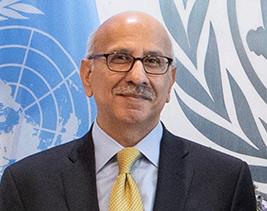Expert Voices
“The SDGs must become the DNA of business strategy and management”

How can governments and businesses step up efforts to finance the Sustainable Development Goals (SDGs)? What are the hopes for the new SDG Stimulus and what role does the Global Investors for Sustainable Development (GISD) Alliance play? The questions on how to secure funding for the SDGs are many and we turn to Navid Hanif, UN DESA’s Assistant-Secretary-General for Economic Development, for answers.
What are the biggest challenges in securing funding for the SDGs, and what are the actions governments, and the private sector can take to overcome them?
“First, the global financial system is simply not set up to adequately finance the SDGs in its current form. The structures are not in place to incentivize and provide enough affordable long-term finance for developing countries and regions to invest in the SDGs. Instead, we have a system that perpetuates unsustainable activities and generates systemic risks.
A major challenge in mobilizing funding for the SDGs is short-sightedness. When confronting the array of economic shocks, the typical response from governments and the private sector has been to pivot to short-term solutions that are often not aligned with the SDGs. This ultimately exacerbates long-term challenges.
Second, lack of capacity in countries for developing projects and programmes that are SDG-aligned. Alignment should be followed by rigorous data collection and reporting to demonstrate impact.
To address these challenges, we need to take short and medium-term measures.
Governments will need to be supported with capacity-building, public-private collaboration and innovative instruments – such as blended finance. The focus should be on building a pipeline of bankable projects that have a significant contribution to the SDGs. It would be necessary to scale up development assistance to help developing countries in these areas.
Governments need to mobilize and attract financing for productive investments, including in resilient infrastructure, sustainable agriculture, and climate adaptation. To support this, the UN Secretary-General has called for an SDG Stimulus comprised of a massive (2 per cent of global GDP) increase in public sector commitments towards development, humanitarian, and climate action, amounting to slightly less than $2 trillion annually.
The private sector also needs to step up. The resources are certainly there. From 2020 to 2021, during the height of the pandemic, global wealth grew by approximately 10% and stood at nearly USD 464 trillion. A small fraction of these assets can be mobilized to finance sustainable development and set us back on track to achieve the global goals.
Businesses and investors should focus on aligning their investments with sustainable development. Though ESG (environmental, social and governance) investing will continue to increase – by some projections ESG assets will balloon to 50 trillion by 2025 – the private sector must demonstrate authenticity and transparency by aligning with the SDGs and delivering net positive impact for the people and planet.
There is also a need to change the global financial architecture so that it supports long term investments in people, planet and prosperity."
With only 8 years left to achieve the goals, the sense of urgency is palpable. How can the business community help rescue the SDGs?
“Governments on their own cannot achieve the goals. The private sector needs to play its part in financing sustainable development. To do this, all private financial flows must be aligned with the SDGs.
The needs are huge. This year, up to 95 million additional people will live in extreme poverty compared to pre-pandemic projections. The current generation of children could lose a combined total of $17 trillion in lifetime earnings due to learning disruptions caused by the pandemic. The world is on track for a global temperature rise of 2.7°C by the end of the century.
To help align and scale up private finance to achieve the SDGs, the UN Secretary-General established the Global Investors for Sustainable Development (GISD) Alliance with global business leaders from across the world, for catalyzing finance and investment for achieving the SDGs.
GISD has produced a standardized definition for the wider business community to better align investments to the SDGs and mitigate the risk of SDG-washing. GISD has also produced SDG-aligned sector-specific metrics to enable credible, consistent, and comparable reporting by corporates and investors. It is important that these are utilized by the wider universe of businesses.
Moreover, businesses should inculcate ‘long-termism’ and sustainability considerations in decision-making. The SDGs must become the DNA of business strategy and management and should be integrated into relevant business sector metrics, indices, benchmarks, and remuneration frameworks.
The business community should also collaborate with the public sector, including multilateral development banks, to develop tools and instruments that facilitate financing and investment into critical SDG sectors such as infrastructure and renewable energy.”
The Global Investors for Sustainable Development (GISD) Alliance will hold its annual meeting on 12 October. What commitments and investments can we expect from the members of this Alliance?
“Since the GISD Alliance was established three years ago, it has been championing the mainstreaming of sustainable development investing amidst major upheavals in our global economy. The Alliance has laid a strong foundation and continues to ramp up efforts to mobilize financing for the SDGs.
At the fourth Annual Meeting, members will present to the UN Secretary-General what the Alliance has achieved so far, and the lessons learnt in this journey. They will focus on innovative instruments and platforms that can scale up investments for the SDGs. The Annual Meeting is an opportunity to explore strategic partnerships that can catalyze critical shift in the finance and investment ecosystem towards sustainable development.
Furthermore, the GISD Alliance will also have a session with UN Member States to discuss their achievements and goals and ways to strengthen public-private partnerships and channel financing to the SDGs, especially in developing countries. “
 Welcome to the United Nations
Welcome to the United Nations